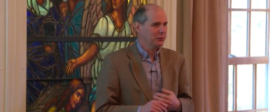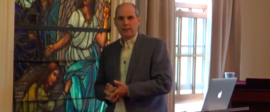Intro to Theology of Work Part 1: The Good News (Video)
Video / Produced by TOW ProjectIn this video, New Testament scholar Sean McDonough gives an introduction to the Theology of Work, starting with the good news in Psalm 104. This is part 1 of Jesus And Your Job, a video series on how Christians in different industries view their work. To find out more about this series and how you can use it as a small group study, go to the Jesus And Your Job homepage.
Intro to the Theology of Work Part 1: The Good News
When we begin thinking about the theology of work, we typically go back to the beginning of the Bible, to Genesis 1. There are lots of good reasons to do that. But today I’m going to begin in the middle—the middle of the Bible more or less – Psalm 104. This is a psalm about the beginnings of the world, but it’s also a psalm about God’s continuing activity in the world.
Often when we think of Genesis 1, we imagine (erroneously) that God worked, God stopped working, and then God let things run their course. Even worse than that, we imagine that God worked, God stopped working, people messed up the world, and God doubly withdrew. Not only was he done with what he did, we think, but God was so repulsed by what he saw people doing that he’ll let the world run its course until Jesus paratroops in, grabs some souls, and zooms back up to heaven. That’s a misleading way to read Genesis, and it’s easy to see how it’s a misreading by dropping into Psalm 104.
Bless the LORD, O my soul.
O LORD my God, you are very great.
You are clothed with honor and majesty,
wrapped in light as with a garment.
You stretch out the heavens like a tent,
you set the beams of your chambers on the waters,
you make the clouds your chariot,
you ride on the wings of the wind,
you make the winds your messengers,
fire and flame your ministers.You set the earth on its foundations,
so that it shall never be shaken.
You cover it with the deep as with a garment;
the waters stood above the mountains.
At your rebuke they flee;
at the sound of your thunder they take to flight.
They rose up to the mountains, ran down to the valleys
to the place that you appointed for them.
You set a boundary that they may not pass,
so that they might not again cover the earth.You make springs gush forth in the valleys;
they flow between the hills,
giving drink to every wild animal;
the wild asses quench their thirst.
By the streams the birds of the air have their habitation;
they sing among the branches.
From your lofty abode you water the mountains;
the earth is satisfied with the fruit of your work.You cause the grass to grow for the cattle,
and plants for people to use,
to bring forth food from the earth,
and wine to gladden the human heart,
oil to make the face shine,
and bread to strengthen the human heart.
The trees of the LORD are watered abundantly,
the cedars of Lebanon that he planted.
In them the birds build their nests;
the stork has its home in the fir trees.
The high mountains are for the wild goats;
the rocks are a refuge for the coneys.
You have made the moon to mark the seasons;
the sun knows its time for setting.
You make darkness, and it is night,
when all the animals of the forest come creeping out.
The young lions roar for their prey,
seeking their food from God.
When the sun rises, they withdraw
and lie down in their dens.
People go out to their work
and to their labor until the evening.O LORD, how manifold are your works!
In wisdom you have made them all;
the earth is full of your creatures.
Yonder is the sea, great and wide,
creeping things innumerable are there,
living things both small and great.
There go the ships,
and Leviathan that you formed to sport in it.These all look to you
to give them their food in due season;
when you give to them, they gather it up;
when you open your hand, they are filled with good things.
When you hide your face, they are dismayed;
when you take away their breath, they die
and return to their dust.
When you send forth your spirit, they are created;
and you renew the face of the ground.May the glory of the LORD endure forever;
may the LORD rejoice in his works—
who looks on the earth and it trembles,
who touches the mountains and they smoke.
I will sing to the LORD as long as I live;
I will sing praise to my God while I have being.
May my meditation be pleasing to him,
for I rejoice in the LORD.
Let sinners be consumed from the earth,
and let the wicked be no more.
Bless the LORD, O my soul.
Praise the LORD!(Psalm 104)
In the first verses of Psalm 104, it seems that as God prepares to go forth outside himself to make something other than himself. Light becomes the mode by which he unveils himself to the world, which is not even yet created. I wonder sometimes whether the language of Christ as creator stems from this image here: when God expresses himself, when God goes outside himself towards something other, if only to create that something other, the image of God going towards the outside is light. And Jesus of course says that he is the light of the world. That image may inform the New Testament’s reflections on who Jesus is: God who expresses himself towards something other. But we’ll leave that to the theologians to sort through.
The critical thing from the first verses of Psalm 104 is that God makes everything by hand. He stretches out the heavens like tents, lays the beam of his upper chambers on their waters, and once he takes care of things up in the cosmic dome, he sets the earth on its foundations. He covers it with the watery depths. So those chaos waters back in Genesis 1, they weren’t there all the time—God created them as part of this process. Then he made the dry land appear. And now the water flows away from the mountains into the valleys, never again will they cover the earth. While Genesis 1 speaks in these serene terms of God just speaking everything into existence, here there’s a little more drama to it: “At your rebuke they flee; at the sound of your thunder they take to flight.” (Psalm 104:7)
At this point in the psalm we’ve gone from primal creation, what God did in the beginning, and we flow without a break into what God does, what God is doing right now. He makes springs pour water into the ravines. By the time we get to verse 11, we are in the present day of the psalmist. The rivers give water to the beasts of the field, and donkeys quench their thirst. That river flows from the beginning of creation right up into the present day.
While Psalm 104 starts with what God did, it continues to describe what God is doing. We can put this in terms of work. In one sense, God worked in the beginning and finished that work. But in another sense, he is still working. Psalm 104 makes it clear that God’s creative work continues to this day.
You’ll notice that from this angle the psalmist is not interested in the fall of humanity, or the rupture between God and humanity, or the shaking of the created order that this disruption engenders. Instead, the waters are flowing serenely from God’s creative acts in the beginning right to that wild donkey quenching its thirst beside some Palestinian stream.
It is relevant to considerations of human work that God who created everything as good continues to sustain that in its goodness. Because we’re a part of that. Our labor is a part of the ongoing goodness of God’s creative work. Our work reflects his work. The psalmist is not interested at this point in thorns and thistles, or about why you hate your job, all things which we will indeed explore next week. From this angle, the psalmist sees human labor as part of the good and very natural ordering of creation.
The psalmist speaks about human labor in glowing terms. Despite any negatives, there’s an aspect of your work which is and was and remains good. We all experience this, even if it’s only intermittently. Whether it’s the memory of one good day you had at your job, or the pleasure you derive from working in your garden, we do in fact get a glimpse of the goodness of labor. This is a critical point of departure for thinking about Jesus and your job. If you think of work as simply a result of the curse, then you’re going to be in a perpetually dysfunctional relationship with your labor. You’re never going to think it’s worth your time or investment, that it’s just all bad all the time, and that even the good things that happen are really illusory – they’re just on the surface and don’t speak to anything real. The good news of Psalm 104 is that the goodness of work is real. When we feel the goodness of our work, it’s a foretaste of who we were created to be.
In Psalm 104 verse 27, God again appears intimately involved in the processes that go on in what we call the natural world, giving each animal its food at the proper time. While the world enjoys independence – it’s different from God—there is also a sense in which God continues to uphold it, sustain it, to destroy to create again.
In the last verse of the psalm, by saying “Let sinners be consumed from the earth, and let the wicked be no more” (Psalm 104:35), the psalmist indicates that he has not entirely forgotten about the fall. The psalmist affirms that God will one day finish up the creation project that he began it in the beginning, that he sustains day by day now, but which the psalmist knows is thwarted often by human wickedness. Nonetheless, the God whose creative power pushed those waters off the mountains long ago will be able to also push the sin and chaos of humanity’s defilements off the earth. In the end, God will finish up what he began and what he continues to do.
To sum up: God worked. He created in the beginning. It was good. God keeps working. He keeps nurturing and sustaining the world. God will finish the job. And in the meantime, our labor is at least in part, at least in principle, a good thing that fits in with the rest of God’s ongoing purposes for the creation.
Discussion Questions:
- In Psalm 104 God does many different types of work. Which of these does the psalmist describe as happening in the past? Which of these is ongoing today?
- Are any types of work listed in Psalm 104 similar to the work you do today?
- How do you think your work relates to God’s work?
Watch the next video, Intro To The Theology of Work Part 2: The Bad News










